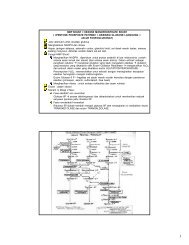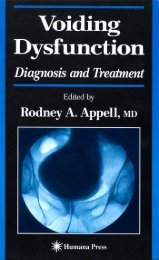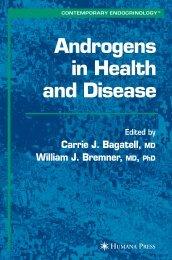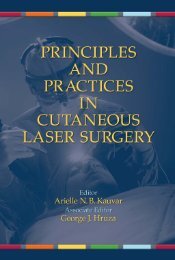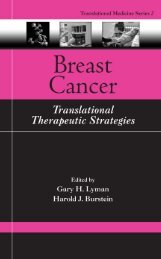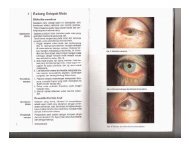- Page 2 and 3: EAES Guidelines for Endoscopic Surg
- Page 4 and 5: Edmund A.M. Neugebauer, Professor,
- Page 6 and 7: VI Preface as possible, early in th
- Page 8 and 9: Contents Chapter 1 The EAES Clinica
- Page 10 and 11: Contents XI Chapter 10 The EAES Cli
- Page 12 and 13: List of Contributors C.C. Abbou Dep
- Page 14 and 15: E. Chouillard Centre Hospitalier In
- Page 16 and 17: N. Y. Haboubi Department of Histopa
- Page 18 and 19: D. Korolija University Surgical Cli
- Page 20 and 21: M. Morino Chirurgia Generale II e C
- Page 22 and 23: G. Scozzari Chirurgia Generale II e
- Page 24 and 25: The EAES Clinical Practice Guidelin
- Page 26 and 27: 1 The EAES Clinical Practice Guidel
- Page 30 and 31: Table 1.4. Ad hocquestionnaires and
- Page 32 and 33: Reliability Internal + + + + + + +
- Page 34 and 35: 1 The EAES Clinical Practice Guidel
- Page 36 and 37: surgery, there were no differences
- Page 38 and 39: surgery, Decker et al. [23] noted a
- Page 40 and 41: Topcu et al. [124] (2b) performed a
- Page 42 and 43: Background and Evidence There is on
- Page 44 and 45: group. Jones et al. [53] analyzed r
- Page 46 and 47: hoc questionnaire was also used by
- Page 48 and 49: iliary duct injury and successful r
- Page 50 and 51: each has an additional subscale con
- Page 52 and 53: Pediatric Quality of Life Inventory
- Page 54 and 55: References 1 The EAES Clinical Prac
- Page 56 and 57: 1 The EAES Clinical Practice Guidel
- Page 58 and 59: 1 The EAES Clinical Practice Guidel
- Page 60 and 61: 1 The EAES Clinical Practice Guidel
- Page 62 and 63: The EAES Clinical Practice Guidelin
- Page 64 and 65: 2 The EAES Clinical Practice Guidel
- Page 66 and 67: 2 The EAES Clinical Practice Guidel
- Page 68 and 69: 2 The EAES Clinical Practice Guidel
- Page 70 and 71: 2 The EAES Clinical Practice Guidel
- Page 72 and 73: 2 The EAES Clinical Practice Guidel
- Page 74 and 75: 2 The EAES Clinical Practice Guidel
- Page 76 and 77: 2 The EAES Clinical Practice Guidel
- Page 78 and 79:
2 The EAES Clinical Practice Guidel
- Page 80 and 81:
2 The EAES Clinical Practice Guidel
- Page 82 and 83:
2 The EAES Clinical Practice Guidel
- Page 84 and 85:
2 The EAES Clinical Practice Guidel
- Page 86 and 87:
2 The EAES Clinical Practice Guidel
- Page 88 and 89:
2 The EAES Clinical Practice Guidel
- Page 90 and 91:
2 The EAES Clinical Practice Guidel
- Page 92 and 93:
2 The EAES Clinical Practice Guidel
- Page 94 and 95:
2 The EAES Clinical Practice Guidel
- Page 96 and 97:
2 The EAES Clinical Practice Guidel
- Page 98 and 99:
2 The EAES Clinical Practice Guidel
- Page 100 and 101:
2 The EAES Clinical Practice Guidel
- Page 102 and 103:
2 The EAES Clinical Practice Guidel
- Page 104 and 105:
2 The EAES Clinical Practice Guidel
- Page 106 and 107:
2 The EAES Clinical Practice Guidel
- Page 108 and 109:
2 The EAES Clinical Practice Guidel
- Page 110 and 111:
88 A.-C. Moberg, A. Montgomery Acce
- Page 112 and 113:
90 A.-C. Moberg, A. Montgomery and
- Page 114 and 115:
92 A.-C. Moberg, A. Montgomery Tabl
- Page 116 and 117:
94 A.-C. Moberg, A. Montgomery Tabl
- Page 118 and 119:
The EAES Clinical Practice Guidelin
- Page 120 and 121:
4 The EAES Clinical Practice Guidel
- Page 122 and 123:
4 The EAES Clinical Practice Guidel
- Page 124 and 125:
4 The EAES Clinical Practice Guidel
- Page 126 and 127:
4 The EAES Clinical Practice Guidel
- Page 128 and 129:
4 The EAES Clinical Practice Guidel
- Page 130 and 131:
4 The EAES Clinical Practice Guidel
- Page 132 and 133:
Table 4.6. Antireflux surgery vs op
- Page 134 and 135:
4 The EAES Clinical Practice Guidel
- Page 136 and 137:
4 The EAES Clinical Practice Guidel
- Page 138 and 139:
4 The EAES Clinical Practice Guidel
- Page 140 and 141:
4 The EAES Clinical Practice Guidel
- Page 142 and 143:
4 The EAES Clinical Practice Guidel
- Page 144 and 145:
4 The EAES Clinical Practice Guidel
- Page 146 and 147:
Gastroesophageal Reflux Disease ±
- Page 148 and 149:
individual view of the predominant
- Page 150 and 151:
5 Gastroesophageal Reflux Disease
- Page 152 and 153:
andomized trials. In some randomize
- Page 154 and 155:
Table 5.2. Randomized comparison be
- Page 156 and 157:
Comparison of Mobilization of the G
- Page 158 and 159:
Endoscopic Antireflux Therapy In th
- Page 160 and 161:
5 Gastroesophageal Reflux Disease
- Page 162 and 163:
5 Gastroesophageal Reflux Disease
- Page 164 and 165:
The EAES Clinical Practice Guidelin
- Page 166 and 167:
All answers received from the panel
- Page 168 and 169:
4 Stage III: generalized purulent p
- Page 170 and 171:
would be prevented thereby. Patient
- Page 172 and 173:
12. Avoiding Recurrent Disease In u
- Page 174 and 175:
6 The EAES Clinical Practice Guidel
- Page 176 and 177:
6 The EAES Clinical Practice Guidel
- Page 178 and 179:
Diverticular Disease ± Update 2006
- Page 180 and 181:
studies have a selection bias, defi
- Page 182 and 183:
The EAES Clinical Practice Guidelin
- Page 184 and 185:
8 The EAES Clinical Practice Guidel
- Page 186 and 187:
8 The EAES Clinical Practice Guidel
- Page 188 and 189:
8 The EAES Clinical Practice Guidel
- Page 190 and 191:
8 The EAES Clinical Practice Guidel
- Page 192 and 193:
8 The EAES Clinical Practice Guidel
- Page 194 and 195:
8 The EAES Clinical Practice Guidel
- Page 196 and 197:
8 The EAES Clinical Practice Guidel
- Page 198 and 199:
8 The EAES Clinical Practice Guidel
- Page 200 and 201:
8 The EAES Clinical Practice Guidel
- Page 202 and 203:
8 The EAES Clinical Practice Guidel
- Page 204 and 205:
8 The EAES Clinical Practice Guidel
- Page 206 and 207:
8 The EAES Clinical Practice Guidel
- Page 208 and 209:
8 The EAES Clinical Practice Guidel
- Page 210 and 211:
8 The EAES Clinical Practice Guidel
- Page 212 and 213:
8 The EAES Clinical Practice Guidel
- Page 214 and 215:
8 The EAES Clinical Practice Guidel
- Page 216 and 217:
8 The EAES Clinical Practice Guidel
- Page 218 and 219:
8 The EAES Clinical Practice Guidel
- Page 220 and 221:
8 The EAES Clinical Practice Guidel
- Page 222 and 223:
8 The EAES Clinical Practice Guidel
- Page 224 and 225:
8 The EAES Clinical Practice Guidel
- Page 226 and 227:
8 The EAES Clinical Practice Guidel
- Page 228 and 229:
8 The EAES Clinical Practice Guidel
- Page 230 and 231:
210 R. Veldkamp et al. Intraoperati
- Page 232 and 233:
212 R. Veldkamp et al.: 9 ColonicCa
- Page 234 and 235:
214 S. Sauerland et al. cal effecti
- Page 236 and 237:
216 S. Sauerland et al. It is beyon
- Page 238 and 239:
218 S. Sauerland et al. fectiveness
- Page 240 and 241:
220 S. Sauerland et al. mended for
- Page 242 and 243:
222 S. Sauerland et al. predictive
- Page 244 and 245:
224 S. Sauerland et al. Fig. 10.1.
- Page 246 and 247:
226 S. Sauerland et al. conference,
- Page 248 and 249:
228 S. Sauerland et al. Surgical Ac
- Page 250 and 251:
230 S. Sauerland et al. American gu
- Page 252 and 253:
232 S. Sauerland et al. One interes
- Page 254 and 255:
234 S. Sauerland et al. lines needs
- Page 256 and 257:
236 S. Sauerland et al. Nutritional
- Page 258 and 259:
238 S. Sauerland et al. Vertical Ba
- Page 260 and 261:
240 S. Sauerland et al. References
- Page 262 and 263:
242 S. Sauerland et al. 44. Buffing
- Page 264 and 265:
244 S. Sauerland et al. 87. Doldi S
- Page 266 and 267:
246 S. Sauerland et al. 130. Hamoui
- Page 268 and 269:
248 S. Sauerland et al. 170. Korenk
- Page 270 and 271:
250 S. Sauerland et al. 215. Meliss
- Page 272 and 273:
252 S. Sauerland et al. 258. Papasa
- Page 274 and 275:
254 S. Sauerland et al. 303. Shekel
- Page 276 and 277:
256 S. Sauerland et al. 342. Weiner
- Page 278 and 279:
Morbid Obesity ± Update 2006 Mario
- Page 280 and 281:
in a multicentric prospective serie
- Page 282 and 283:
NIS. Risk factors for increased pos
- Page 284 and 285:
The EAES Clinical Practice Guidelin
- Page 286 and 287:
Table 12.1. Evaluation of feasibili
- Page 288 and 289:
12 The EAES Guidelines on Cholecyst
- Page 290 and 291:
12 The EAES Guidelines on Cholecyst
- Page 292 and 293:
12 The EAES Guidelines on Cholecyst
- Page 294 and 295:
12 The EAES Guidelines on Cholecyst
- Page 296 and 297:
12 The EAES Guidelines on Cholecyst
- Page 298 and 299:
12 The EAES Guidelines on Cholecyst
- Page 300 and 301:
12 The EAES Guidelines on Cholecyst
- Page 302 and 303:
12 The EAES Guidelines on Cholecyst
- Page 304 and 305:
12 The EAES Guidelines on Cholecyst
- Page 306 and 307:
12 The EAES Guidelines on Cholecyst
- Page 308 and 309:
12 The EAES Guidelines on Cholecyst
- Page 310 and 311:
292 J. Zehetner et al. Operative Ve
- Page 312 and 313:
294 J. Zehetner et al. 11. Kum CK,
- Page 314 and 315:
Inguinal Hernia Repair ± Update 20
- Page 316 and 317:
outcomes as large numbers of surgeo
- Page 318 and 319:
14 Inguinal Hernia Repair ± Update
- Page 320 and 321:
Frustration is a frequently encount
- Page 322 and 323:
Prosthetic Repair and Other Surgery
- Page 324 and 325:
14 Inguinal Hernia Repair ± Update
- Page 326 and 327:
14 Inguinal Hernia Repair ± Update
- Page 328 and 329:
312 A. Paul et al. most relevant th
- Page 330 and 331:
314 A. Paul et al. Table 15.1. Pred
- Page 332 and 333:
316 A. Paul et al. other invasive d
- Page 334 and 335:
318 A. Paul et al. Table 15.4. Rati
- Page 336 and 337:
320 A. Paul et al. Closing Remarks
- Page 338 and 339:
322 A. Paul et al. 38. Davidson BR,
- Page 340 and 341:
324 A. Paul et al. 81. Lewis RT, Al
- Page 342 and 343:
326 A. Paul et al. 123. Phillips EH
- Page 344 and 345:
328 A. Paul et al.: 15 The EAES Cli
- Page 346 and 347:
330 J. Treckmann et al. Endoscopic
- Page 348 and 349:
332 J. Treckmann et al. References
- Page 350 and 351:
The EAES Clinical Practice Guidelin
- Page 352 and 353:
17 The EAES Clinical Practice Guide
- Page 354 and 355:
17 The EAES Clinical Practice Guide
- Page 356 and 357:
17 The EAES Clinical Practice Guide
- Page 358 and 359:
17 The EAES Clinical Practice Guide
- Page 360 and 361:
17 The EAES Clinical Practice Guide
- Page 362 and 363:
17 The EAES Clinical Practice Guide
- Page 364 and 365:
17 The EAES Clinical Practice Guide
- Page 366 and 367:
17 The EAES Clinical Practice Guide
- Page 368 and 369:
17 The EAES Clinical Practice Guide
- Page 370 and 371:
17 The EAES Clinical Practice Guide
- Page 372 and 373:
17 The EAES Clinical Practice Guide
- Page 374 and 375:
17 The EAES Clinical Practice Guide
- Page 376 and 377:
17 The EAES Clinical Practice Guide
- Page 378 and 379:
17 The EAES Clinical Practice Guide
- Page 380 and 381:
17 The EAES Clinical Practice Guide
- Page 382 and 383:
17 The EAES Clinical Practice Guide
- Page 384 and 385:
370 D. Ignjatovic, R. Bergamaschi:
- Page 386 and 387:
372 G. Borzellino a division of the
- Page 388 and 389:
374 G. Borzellino Conversion for Ga
- Page 390 and 391:
Acute Pancreatitis ± Update 2006 J
- Page 392 and 393:
Table 20.1. Scoring systems for acu
- Page 394 and 395:
unfit for surgery, endoscopic sphin
- Page 396 and 397:
20 Acute Pancreatitis ± Update 200
- Page 398 and 399:
tube insertion, and it is probably
- Page 400 and 401:
Acute Appendicitis ± Update 2006 S
- Page 402 and 403:
omy seems to offer few additional a
- Page 404 and 405:
392 F. Agresta Choice of Surgical A
- Page 406 and 407:
Adhesions and Small Bowel Obstructi
- Page 408 and 409:
caecal valve until the site of obst
- Page 410 and 411:
Laparoscopic Surgery: Strategies fo
- Page 412 and 413:
25 Laparoscopic Surgery: Strategies
- Page 414 and 415:
Subject Index A Abdominal emergenci
- Page 416 and 417:
± appropriate surgical procedure 3
- Page 418 and 419:
± etiology 145 ± Hinchey 149 ± i
- Page 420 and 421:
± incarcerated Hernia 347 ± lapar
- Page 422 and 423:
± perioperative aspects 63 ± peri




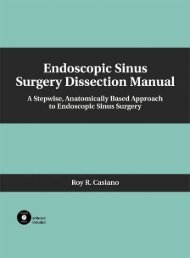
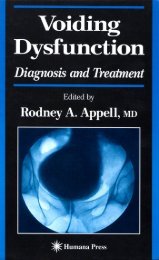
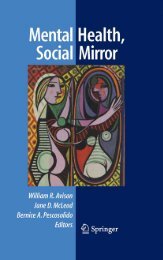
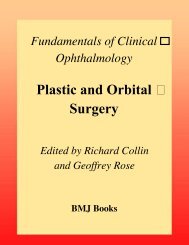
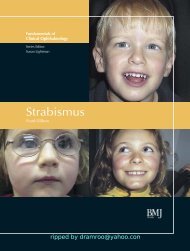
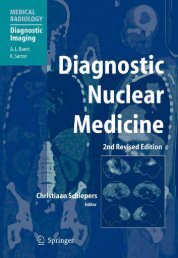
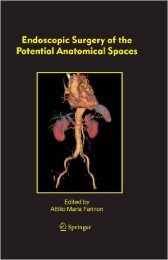
![SISTEM SENSORY [Compatibility Mode].pdf](https://img.yumpu.com/20667975/1/190x245/sistem-sensory-compatibility-modepdf.jpg?quality=85)
